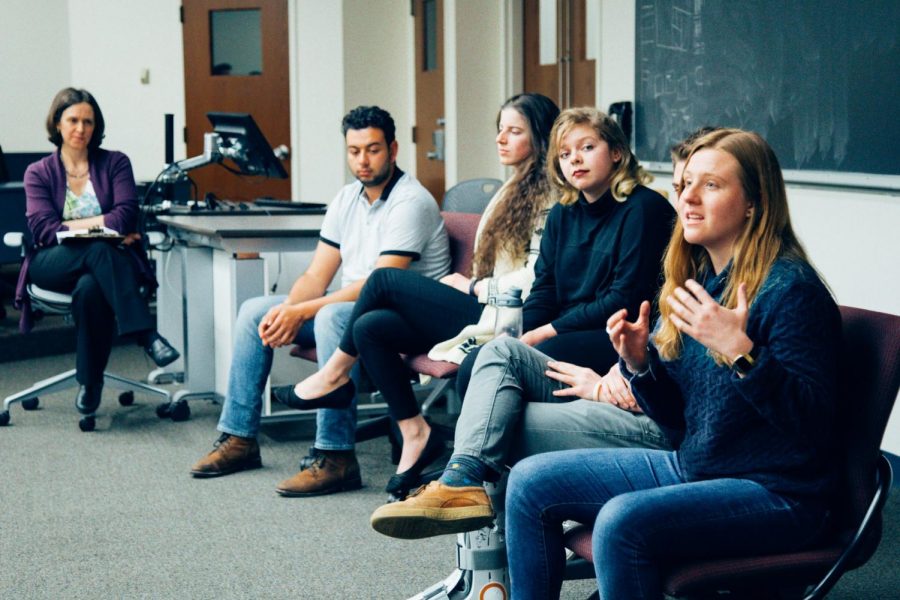Scout gets real about impostor phenomenon
Photo courtesy Jack Vogelsang, Scout
Panelist Katie Wilhoit responds to a question during Scout’s “Fake It Till You Make It” discussion.
February 14, 2019
Members and guests gathered in Shillman Hall on Thursday for the student-led design studio Scout’s first panel on impostor syndrome, titled “Fake It Till You Make It.”
Scout marketing and events director Camaryn McKenzie introduced the event with a short video a former Scout member showed her when McKenzie felt unworthy of being at Northeastern. The video features a voice-over from an interview in which radio-personality Ira Glass speaks on the initial stages of working in a creative field.
Department of Art + Design co-op coordinator Dori Mazor moderated the event and revealed the misnomer of the evening’s topic. About 70 percent of the population experiences “impostor syndrome,” which, as Mazor noted, is not a syndrome at all, and more accurately labeled as “impostor phenomenon.”
“If you think you have impostor phenomenon, you’re in good company,” Mazor said, going on to name celebrities such as Michelle Obama and Natalie Portman who have expressed similar feelings.
According to a 2011 journal article in the International Journal of Behavioral Science, individuals with the impostor phenomenon “experience intense feelings that their achievements are undeserved and worry that they are likely to be exposed as a fraud.”
Five panelists discussed their experiences with impostor phenomenon, both in Scout and at Northeastern. The group gave several strategies that help them overcome the feelings.
For panelist and fifth-year international affairs major Katie Wilhoit, that means “going and talking with other people … but also finding mentors.”
The idea of seeking mentorship was a common thread throughout the event.
“If you ask someone for help, nine times out of 10, they’ll be open to helping,” said panelist Molly O’Neill, a Northeastern graduate and founder of the design studio Juno.
Another topic was dealing with failure. After Scout denied her designer application, panelist Elizabeth Cavallo, a third-year marketing major, tried her hand at the “logistics side” of Scout and has since worked her way up to a project lead position.
“You never know where you’ll have talents,” Cavallo said.
Scout member and third-year graphic design major Laura Shrago appreciated hearing about the panel’s experiences with “different things that in the moment seemed like the end of the world … and they ended up being okay.”
“It’s kind of reassuring in a weird way,” Shrago said.
The panel closed with final pieces of advice for the audience.
Panelist Bailey Kane, a fifth-year computer engineering and computer science major, said it’s helpful to reassure himself by viewing his progress comparatively and retracing his steps.
“I’ve done X, Y, Z before, and I’ll do it again,” Kane said.
The topic for Thursday’s panel arose from McKenzie’s conversations around co-op applications opening after realizing a lot of her peers felt as though they were unqualified.
“I wanted to open up the conversation and let everyone know they’re not alone,” McKenzie said.
Scout is hosting its second annual design conference “Interventions: Narrative” on April 6.







